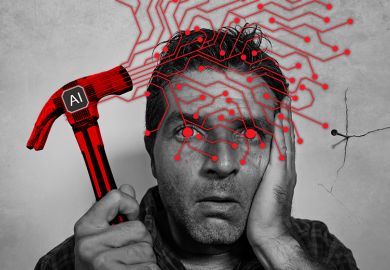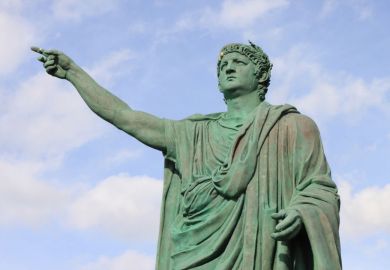Source: Miles Coles
I have two secondary school teachers in my extended family, but only one has gone back after this year’s summer break. The other tells me that she would rather clean public lavatories than spend another day teaching.
This was a person who spent her undergraduate years aspiring to teach, who was absolutely delighted when she was accepted on to a postgraduate certificate in education course and whose subject, mathematics, is vital to the core curriculum. So what went so drastically wrong in just two years?
Her problems began with the PGCE. By the end of her first term she was ready to throw in the towel, depressed by the perceived irrelevance of much of the coursework. Why ask a mathematician, unused to essay writing, to compare five jargon-ridden comments by American educational theorists, each of whom appeared to be saying the same thing? (As an aside, I think I understand why six-year-olds are now referred to in the UK as “students” rather than “pupils”: it reflects the way in which PGCE reading lists are skewed towards US theories.)
My other teacher relation, a geographer, also ran into problems early when her PGCE group was told never to correct grammar or spelling because this would lower pupils’ (sorry, students’) self-esteem. Querying this on the grounds that surely the role of a teacher was to prepare children for life beyond school, where spelling might just make a difference in a job application, she was taken aside and asked whether she wanted to have a life. Given the pressure to fill in endless forms and to mark endless cardboard boxes of coursework, she was told, any teacher trying to correct spelling would be condemned to a treadmill of endless labour. No PGCE course prepares teachers for this Herculean task.
Both women looked forward eagerly to classroom practice, but both found the chasm between the theory they had read and the eventual classroom experiences to be as wide as the Pacific Ocean. Was it necessary, they asked, to have so much of the theory crammed in at the start of their courses? Might it not have made more sense to have it integrated throughout the year, so that the gaps between principle and reality could be worked through?
Personally, I wouldn’t want to try to remember some of the stuff they passed on to me to read during their first PGCE months. Nor would I want to repeat some of the truly daft essay titles they were given. But if I were a teacher I would certainly want to know how best to deal with the child who threatens to stab me in the head, the boy who refuses point-blank to be taught by a female teacher or the child who sings and shouts through an entire lesson with her feet up on the desk (but who is not to be removed from the classroom because the verdict of the headteacher is that she is “just having a bad day”).
I find it significant that the teacher who survived, the geographer, was the one who had not gone straight into the PGCE after graduating. She had done an MSc and a year’s supply teaching in tough inner-city schools before deciding that teaching was for her. She already had some sense of the difficulties she would encounter, whereas going into teacher training straight from undergraduate life was much tougher. Also, the mathematician clearly had an unsupportive headteacher, who was struggling to hang on in a failing school, which hardly helped to give her a good insight into the teaching profession.
Most teachers I have spoken to think that what is needed is a root and branch rethink of how we train teachers for today’s world, in which the dreaded Ofsted inspections often mean that a trainee teacher is told to keep quiet about problems encountered in the classroom so as not to “damage the school”. There are clearly major problems with a lack of support for and communication with trainee teachers in some schools, as well as a lack of communication between academic tutors and the schools. Many trainee teachers feel as if they are inhabiting different universes as they move between schools and universities, and that the trainers live in a bubble and could not begin to cope with the sorts of kids they deal with in the schools.
What distresses me is the waste of it all. Of course not everyone is cut out for teaching, and it is as well to realise that early enough to change career, as my mathematician has done. The geographer, on the other hand, is thriving in a tough inner-city all-boys school, but she looks back on her PGCE year as a costly and unhelpful hiatus.
Teacher training has already begun to move out of universities and into schools, and the number of funded PGCE places has started to plummet. Last week, Times Higher Education reported that higher education institutions are to lose 3,800 places in 2014-15. But is this shift the right solution? Older teachers tell me that the theory they studied does eventually acquire relevance, so they would be loath to lose it altogether.
Over the years, I have listened to hours of debate in university meetings about how best to train teachers, but the issues never seem to be resolved. Universities need to make a strong case to retain a role in teacher training – a good place to start would be to canvass the views of recent PGCE graduates to gain a better understanding of the value, or otherwise, of the training they received. Hopefully there are more teachers than lavatory cleaners among them.
Register to continue
Why register?
- Registration is free and only takes a moment
- Once registered, you can read 3 articles a month
- Sign up for our newsletter
Subscribe
Or subscribe for unlimited access to:
- Unlimited access to news, views, insights & reviews
- Digital editions
- Digital access to THE’s university and college rankings analysis
Already registered or a current subscriber?




